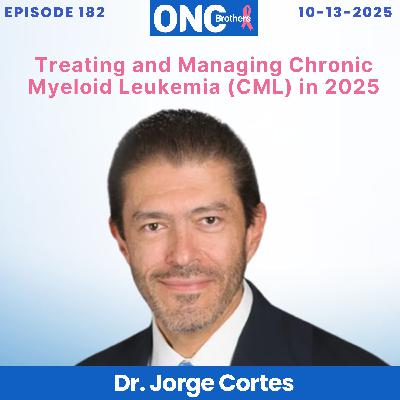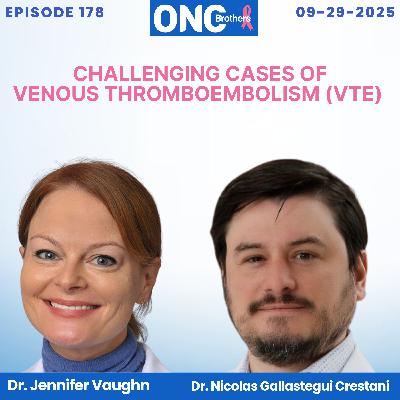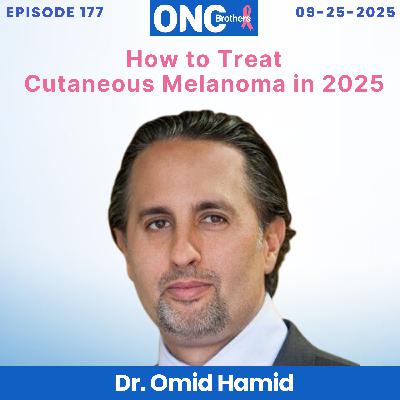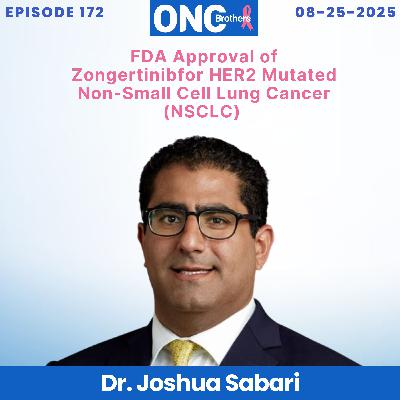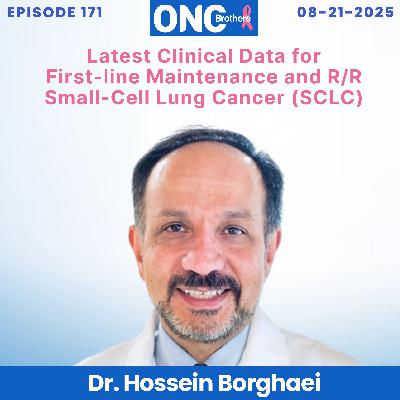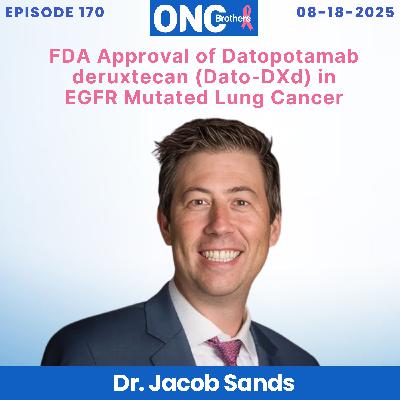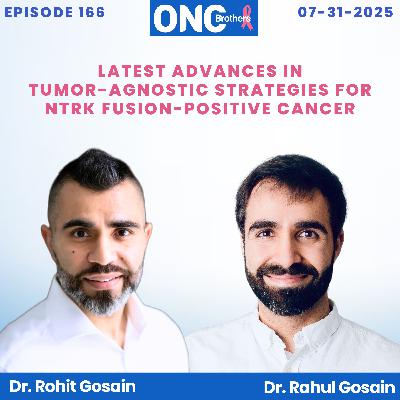Discover Oncology Brothers: Practice-Changing Cancer Discussions
Oncology Brothers: Practice-Changing Cancer Discussions

Oncology Brothers: Practice-Changing Cancer Discussions
Author: Oncology Brothers
Subscribed: 9Played: 214Subscribe
Share
© Oncology Brothers
Description
On a mission to disseminate information to the community and bridge the gap between academia and community oncology in this rapidly changing field of hematology & oncology. Drs. Rahul & Rohit Gosain interview world-renowned hematologists/oncologists to present the practice-changing data in a small bite-sized format where one could immediately apply that information in their daily practice to provide the best cancer care to their patients close to home.
180 Episodes
Reverse
Join us for another insightful episode of The Oncology Brothers as we dive into the Challenging Case Series! In this episode, we were joined by Dr. Eric Singhi, a thoracic medical oncologist from MD Anderson, to discuss the complexities of treating EGFR-positive non-small cell lung cancer (NSCLC).We explored the latest treatment options, including:• Osimertinib• Amivantamab plus Lazertinib (based on the MARIPOSA trial)• Osimertinib plus chemotherapy (from the FLAURA2 trial)Listen in as we analyze real-life patient cases, focusing on a 58-year-old gentleman with CNS involvement and a 66-year-old woman experiencing disease progression after initial treatment. Dr. Singhi shared valuable insights on the importance of supportive care, the impact of treatment combinations, and the significance of repeat tissue profiling.Key topics covered:• The latest data from the MARIPOSA and FLAURA2 trials• Strategies for managing side effects and improving patient quality of life• The role of multidisciplinary teams in treatment planning• The importance of understanding resistance patterns in treatment decisionsWhether you're a healthcare professional or simply interested in oncology, this episode is packed with essential information and expert perspectives. Follow us on social media:• X/Twitter: https://twitter.com/oncbrothers• Instagram: https://www.instagram.com/oncbrothers• Website: https://oncbrothers.com/Don't forget to like, subscribe, and hit the notification bell for more episodes from The Oncology Brothers!#EGFRNSCLC #Mariposa #Amivantamab #Osimertinib #FLAURA2 #OncologyBrothers #LungCancer
In this episode of Oncology Brothers, we dived deep into the world of CDK4-6 inhibitors, focusing on their side effects and management in breast cancer treatment. Joined by an esteemed guest, Dr. Stephanie Graff, a medical breast oncologist from Brown University Health. We explored the side effects and management strategies for three commonly used CDK4/6 inhibitors: ribociclib, abemaciclib, and palbociclib.Key topics discussed include:• The evolving role of CDK4/6 inhibitors in early breast cancer and adjuvant settings.• Detailed management of side effects such as QT prolongation, liver function tests, and diarrhea.• The importance of shared decision-making with patients regarding treatment options.• Insights into the latest clinical trial data and its implications for practice.Whether you're a healthcare professional or someone interested in oncology, this episode provides valuable insights into optimizing patient care while managing the complexities of CDK4-6 inhibitors.Follow us on social media:• X/Twitter: https://twitter.com/oncbrothers• Instagram: https://www.instagram.com/oncbrothers• Website: https://oncbrothers.com/Don't forget to like, subscribe, and check out our other episodes for more discussions on oncology treatments and patient management strategies!#CDK4/6inhibitors #BreastCancer #Ribociclib #Abemaciclib #Palbociclib #OncologyBrothers #SideEffectManagement #HRpositiveBC
In this episode of the Oncology Brothers podcast, we welcomed back Dr. Jorge Cortes from the Georgia Cancer Center to discuss the latest updates in the management of Chronic Myeloid Leukemia (CML).Join us as we dive into the essential aspects of CML treatment, including:• The importance of initial workup and bone marrow biopsy in diagnosing CML.• Risk stratification and the selection of first-line therapies, including the latest TKIs like Asiminib and Ponatinib.• Patient-centered decision-making and how to align treatment options with individual patient goals.• Monitoring for response using BCR-ABL titer and the role of minimal residual disease (MRD).• The significance of managing side effects associated with various TKIs, including cardiovascular risks and unique toxicities.• Insights into the role of transplant in accelerated and blast phases of CML.Whether you're a healthcare professional or someone interested in the latest advancements in oncology, this episode provides valuable insights into the evolving landscape of CML treatment.Follow us on social media:• X/Twitter: https://twitter.com/oncbrothers• Instagram: https://www.instagram.com/oncbrothers• Website: https://oncbrothers.com/Don't forget to like, subscribe, and tune in for more episodes on treatment algorithms, FDA approvals, and conference highlights.#CML #TKIs #Asciminib #Imatinib #Pontatinib #Bosutinib #Dasatinib #Nilotinib #BCR-ABL #Hematology #OncologyBrothers #JorgeCortes
Welcome to the Oncology Brothers podcast! In this Challenging Cases episode, we take a deep dive into thrombocytopenia management—a common yet often perplexing topic in everyday hematology and oncology practice. We are joined by Dr. Ronak Mistry, hematologist at the University of Pennsylvania and co‑host of Fellows on Call, to walk through real‑world cases spanning ITP, anticoagulation with low platelets, and HIT.We covered essential topics such as:• Workup of thrombocytopenia and confirming the diagnosis of ITP• First‑ and second‑line ITP therapy—steroids, IVIG, TPO receptor agonists, and splenectomy• Managing anticoagulation in thrombocytopenic patients with cirrhosis and DVT• Step‑by‑step approach to suspected HIT in the inpatient setting• Rapid‑fire tips—transfusion thresholds, chemo‑related thrombocytopenia, and medication culpritsWhether you’re a hematologist, oncologist, or internal medicine resident, this episode is packed with case‑based teaching points, practical pearls, and the latest guidance from ASH and NCCN for non‑malignant hematology.Follow us on social media:• X/Twitter: https://twitter.com/oncbrothers• Instagram: https://www.instagram.com/oncbrothers• Website: https://oncbrothers.com/Don’t forget to like, subscribe, and tune in for more challenging case discussions, treatment strategies, and expert insights from the world of hematology and oncology!#Thrombocytopenia #HematologyPodcast #ITP #HIT #OncologyBrothers
In this episode of the Oncology Brothers podcast, we dive deep into the latest advancements in treating extensive stage small cell lung cancer (SCLC), focusing on the IMforte data and its clinical implications. We welcomed esteemed thoracic medical oncologists Drs. Isabel Preeshagul, Ticiana Leal, and Dr. Stephen Liu to discuss the findings presented at ASCO 2025 and World Lung 2025.Key topics included:• Overview of the IMforte study design and patient population• The role of lurbinectedin and atezolizumab as maintenance therapy• Significant improvements in progression-free survival (PFS) and overall survival (OS)• Management of side effects and the importance of prophylactic growth factors• Patient selection criteria for this new standard of careWith a focus on bridging the gap between community and academia, this episode provides valuable insights for medical oncologists and patients alike. Tune in to learn how these advancements are changing the landscape of SCLC treatment and improving patient outcomes. Follow us on social media:• X/Twitter: https://twitter.com/oncbrothers• Instagram: https://www.instagram.com/oncbrothers• Website: https://oncbrothers.com/Don't forget to like, subscribe, and check out our other discussions on recent approvals, treatment algorithms, and challenging cases. We are the Oncology Brothers!#IMforte #SCLC #Lurbinectedin #MaintenanceTherapy #ASCO2025 #OncologyBrothers #ES-SCLC
Welcome to the Oncology Brothers podcast! In this episode, we dive into the evolving landscape of neuroendocrine tumors (NETs) with guests Dr. Heloisa Soares, a medical oncologist, and Prof. Ken Herrmann, a nuclear medicine specialist. Together, we explored the role of Peptide Receptor Radionuclide Therapy (PRRT), imaging breakthroughs, and treatment sequencing to optimize outcomes for NET patients.We cover essential topics such as:• The role of Gallium-68 and Copper-64 DOTATATE PET imaging in diagnosis and planning• Second-line standard use of PRRT and emerging data for first-line therapy• Toxicities of PRRT—nausea, kidney toxicity, and bone marrow suppression• Balancing sequencing strategies in well-differentiated and higher-grade tumors• The critical role of multidisciplinary tumor boards in NET management• Future directions including PRRT retreatment and ongoing clinical trialsFollow us on social media:• X/Twitter: https://twitter.com/oncbrothers• Instagram: https://www.instagram.com/oncbrothers• Website: https://oncbrothers.com/Don't forget to like, subscribe, and tune in for more discussions on challenging cases, treatment algorithms, and expert insights in the field of oncology!#NeuroendocrineTumors #NETs #PRRT #OncologyBrothers #CancerTreatment #NuclearMedicine
Welcome to the Oncology Brothers podcast! In this episode we we deep into the complexities of venous thromboembolism (VTE) with Drs. Jennifer Vaughn and Nicolas Gallastegui Crestani from The Ohio State University. Join us as we explore real-life VTE scenarios, discussing both provoked and unprovoked events, treatment durations, and cancer-associated cases. We cover essential topics such as:• The workup for hypercoagulable states in young patients• Long-term anticoagulation strategies for high-risk individuals• The role of D-dimer and risk scores in decision-making• Management of anticoagulation in patients with cancer undergoing treatment• Rapid-fire scenarios including superficial vein thrombosis and portal vein thrombosisWhether you're a healthcare professional or simply interested in the latest in oncology and hematology, this episode is packed with valuable insights and practical guidance.Follow us on social media:• X/Twitter: https://twitter.com/oncbrothers• Instagram: https://www.instagram.com/oncbrothers• Website: https://oncbrothers.com/Don't forget to like, subscribe, and tune in for more discussions on challenging cases, treatment algorithms, and expert insights in the field of oncology!#VTE #Anticoagulation #DOACs #Hematology #MedEd #OncologyBrothers #Thrombosis #Clots #DVT #PE
In this episode of the Oncology Brothers podcast, we are joined by Dr. Omid Hamid, a melanoma specialist from Cedars-Sinai, to explore the current treatment landscape of cutaneous melanoma.We covered a wide range of topics, including:• The standard of care for early-stage melanoma, including wide local excision and sentinel lymph node evaluation.• The role of adjuvant immunotherapy and BRAF/MEK inhibitors for high-risk patients.• Insights into neoadjuvant treatment options for resectable disease, including recent trial data from NADINA and SWOG S1808.• The importance of next-generation sequencing (NGS) and circulating tumor DNA (ctDNA) in treatment planning and monitoring.• The evolving treatment paradigm for metastatic melanoma, including the use of dual checkpoint inhibitors and BRAF/MEK inhibitors.Join us as we discuss the latest advancements in melanoma treatment and the critical role of patient education and shared decision-making in oncology care.Follow us on social media:• X/Twitter: https://twitter.com/oncbrothers• Instagram: https://www.instagram.com/oncbrothers• Website: https://oncbrothers.com/Don't forget to subscribe for more episodes on treatment algorithms, new FDA approvals, and conference highlights!#Melanoma #Immunotherapy #BRAF #ctDNA #Neoadjuvant #OncologyBrothers
Welcome to the Oncology Brothers podcast! In this episode, we dive deep into the world of neuroendocrine tumors (NETs) with renowned expert Dr. Thor Halfdanarson from the Mayo Clinic.Join us as we explore:• The critical factors in diagnosing NETs, including origin, grade, histological features, and Ki-67.• The importance of differentiating between functional and non-functional tumors and how this impacts treatment decisions.• Dr. Halfdanarson's treatment paradigm, including the use of somatostatin analogs, radioligand therapy, and other targeted treatments.• Monitoring strategies for patients, including the role of imaging and tumor markers like 5-HIAA and chromogranin.• Insights into the evolving role of immunotherapy and next-generation sequencing in managing high-grade neuroendocrine carcinomas.Whether you're a healthcare professional or simply interested in the latest advancements in oncology, this episode is packed with valuable information and practical insights.Follow us on social media:• X/Twitter: https://twitter.com/oncbrothers• Instagram: https://www.instagram.com/oncbrothers• Website: https://oncbrothers.com/Don't forget to subscribe for more discussions on cutting-edge cancer treatments and expert opinions in the field of oncology!
Join us in this episode of the Oncology Brothers podcast as we dive into the highlights from the World Conference on Lung Cancer 2025! We are joined by Dr. Balazs Halmos, a thoracic medical oncologist at the Montefiore Einstein Cancer Center, to discuss three pivotal studies that are shaping the future of lung cancer treatment.In this episode, we covered:• FLAURA2 Trial: Discover the significant overall survival benefits of combining osimertinib with chemotherapy for patients with EGFR-positive non-small cell lung cancer, and how it compares to single-agent osimertinib.• HARMONi Trial: Explore the intriguing yet complex findings of a new bi-specific antibody targeting PD-1 and VEGF in patients with progressive EGFR-mutated disease, and the implications of its current negative results.• ALCHEMIST Trial: Learn about the role of crizotinib in the adjuvant setting for ALK-positive lung cancer and why it reinforces alectinib as the standard of care.Tune in for an insightful discussion on the latest advancements in precision medicine, the importance of ctDNA, and the evolving landscape of lung cancer treatment. Follow us on social media:• X/Twitter: https://twitter.com/oncbrothers• Instagram: https://www.instagram.com/oncbrothers• Website: https://oncbrothers.com/Don't forget to like, subscribe, and hit the notification bell for more updates from the Oncology Brothers!
Join us for an insightful episode as we dive deep into the evolving landscape of Chronic Lymphocytic Leukemia (CLL) treatment. This episode features Dr. Mazyar Shadman, an expert in lymphoid malignancies from the Fred Hutch Cancer Center.In this episode, we covered:• The importance of shared decision-making in CLL treatment.• When to initiate treatment for newly diagnosed CLL patients.• The role of time-limited venetoclax-based regimens versus continuous BTK inhibitors.• Key considerations in choosing the right BTK inhibitor and managing side effects.• The relevance of minimal residual disease (MRD) in treatment duration.• Sequencing strategies for relapsed and refractory CLL, including the use of Pirtobrutinib and CAR-T therapy.Whether you're a healthcare professional or someone interested in the latest advancements in oncology, this episode is packed with valuable insights and practical advice.Don't forget to like, subscribe, and leave us your feedback! Your support helps us bring these important discussions to a wider audience. Tune in now and stay informed about the latest in CLL treatment!Follow us on social media:• X/Twitter: https://twitter.com/oncbrothers• Instagram: https://www.instagram.com/oncbrothers• Website: https://oncbrothers.com/#Ibrutinib #acalabrutinib #zanubrutinib #Pirtobrutinib #CLL2025 #BTKinhibitors #Venetoclax #MRDnegative #OncologyBrothers
Welcome back to the Oncology Brothers podcast! In this episode, we continue the three-part CME series on small cell lung cancer, focusing on adverse events and management strategies for extensive stage small cell lung cancer treatments.We are thrilled to have Dr. Misty Shields from the Indiana University join us to discuss the latest advancements in treatment options following the exciting data presented at ASCO 2025. We dived into the treatment algorithm for patients with good performance status, including the use of chemoimmunotherapy, lurbinectedin, and tarlatamab.Key topics covered in this episode:• Overview of the current treatment landscape and new data from ASCO 2025• Common side effects associated with lurbinectedin and immunotherapy• Strategies for managing adverse events, including hematologic toxicities and liver function monitoring• The role of supportive care and palliative care in enhancing patient quality of life• Collaboration between community oncologists and academic centers for optimal patient careJoin us as we explore the challenges and opportunities in managing extensive stage small cell lung cancer, and learn how to provide the best care for patients facing this devastating disease.Accreditation/Credit DesignationPhysicians’ Education Resource®, LLC is accredited by the Accreditation Council for Continuing Medical Education (ACCME) to provide continuing medical education for physicians.Physicians’ Education Resource®, LLC designates this enduring material for a maximum of 0.25 AMA PRA Category 1 Credits™. Physicians should claim only the credit commensurate with the extent of their participation in the activity.Acknowledgment of Commercial SupportThis activity is supported by an educational grant from Jazz Pharmaceuticals, Inc.Link to gain CME credits from this activity:https://www.gotoper.com/courses/practical-considerations-and-future-directions-for-new-treatment-strategies-in-sclcFollow us on social media:• X/Twitter: https://twitter.com/oncbrothers• Instagram: https://www.instagram.com/oncbrothers• Website: https://oncbrothers.com/
Welcome back to the Oncology Brothers podcast! In this episode, Drs. Rohit & Rahul Gosain are joined by Dr. Joshua Sabari from the NYU Langone Cancer Center to discuss the exciting recent approval of Zongertinib, the first oral TKI for HER2-positive lung cancer.We dived deep into the prevalence of HER2 mutations in non-small cell lung cancer, the study design and findings from the Beamion LUNG-1 trial, and the implications of this new therapy in clinical practice. Dr. Sabari shared insights on the efficacy of Zongertinib, including impressive response rates and progression-free survival data, as well as its side effect profile compared to other treatments like trastuzumab deruxtecan (T-DXd).Key topics covered in this episode:• Overview of HER2 mutations in lung cancer• Study design and results of the Beamion LUNG-1• Comparison of Zongertinib and T-DXd in treatment settings• Management of common side effects associated with Zongertinib• Future directions for HER2-targeted therapiesJoin us for this informative discussion as we explore the latest advancements in lung cancer treatment and what they mean for patients and clinicians alike. Don't forget to subscribe for more episodes on new approvals, side effect management, and practice-changing data in oncology!Follow us on social media:• X/Twitter: https://twitter.com/oncbrothers• Instagram: https://www.instagram.com/oncbrothers• Website: https://oncbrothers.com/
Welcome to the Oncology Brothers podcast! In this episode, we kick off a three-part CME series focused on small cell lung cancer (SCLC). Joined by Dr. Hossein Borghaei, Chief of Thoracic Oncology at the Fox Chase Cancer Center. Together they dived into the evolving treatment landscape for SCLC, highlighting recent advancements and data from ASCO 2025.Episode Highlights:• Overview of the current standard of care for limited and extensive-stage SCLC.• Discussion on the role of concurrent chemoradiation therapy and the new standard of care involving immunotherapy.• Insights into the use of lurbinectedin in maintenance therapy and its impact on overall survival.• Exploration of the promising results from the DeLLphi study on tarlatamab, a bispecific antibody, and its implications for treatment.• The importance of patient selection and managing side effects in treatment decisions.Join us as we navigate the complexities of SCLC treatment and look forward to future advancements that may improve patient outcomes.Accreditation/Credit DesignationPhysicians’ Education Resource®, LLC is accredited by the Accreditation Council for Continuing Medical Education (ACCME) to provide continuing medical education for physicians.Physicians’ Education Resource®, LLC designates this enduring material for a maximum of 0.25 AMA PRA Category 1 Credits™. Physicians should claim only the credit commensurate with the extent of their participation in the activity.Acknowledgment of Commercial SupportThis activity is supported by an educational grant from Jazz Pharmaceuticals, Inc.Link to gain CME credits from this activity:https://www.gotoper.com/courses/breaking-down-the-latest-clinical-data-for-first-line-maintenance-and-rr-sclc Follow us on social media:• X/Twitter: https://twitter.com/oncbrothers• Instagram: https://www.instagram.com/oncbrothers• Website: https://oncbrothers.com/#OncologyBrothers #SmallCellLungCancer #CME #ASCO2025 #LungCancer #Immunotherapy #CancerTreatment
In this episode of the Oncology Brothers podcast, Drs. Rohit & Rahul Gosain welcome Dr. Jacob Sands, a thoracic medical oncologist from the Dana-Farber Cancer Institute, to discuss the recent FDA approval of Dato-DXD (datopotamab deruxtecan) for previously treated EGFR-mutated non-small cell lung cancer (NSCLC).Key Topics:• Overview of Dato-DXd and its FDA approval• Mechanism of action and study design of the TROPION Lung trials• Efficacy and safety profile of Dato-DXd• Management of side effects and clinical pearls• Treatment sequencing for EGFR-mutated NSCLCJoin us as we dive into the details of the TROPION Lung trials that led to this significant approval, the mechanism of action of Dato-DXd, and the implications for patients with various EGFR mutations. Dr. Sands shared insights on the study design, efficacy, and tolerability of this new antibody-drug conjugate, as well as important clinical pearls for managing side effects such as stomatitis, dry eyes, and interstitial lung disease (ILD).We also explored the current treatment landscape for EGFR-mutated NSCLC, including the sequencing of therapies and the potential role of Dato-DXd in clinical practice.Tune in for an informative discussion that highlights the exciting advancements in oncology and the hope they bring to patients.Follow us on social media:• X/Twitter: https://twitter.com/oncbrothers• Instagram: https://www.instagram.com/oncbrothers• Website: https://oncbrothers.com/Don't forget to like, subscribe, and check out our other episodes for more insights into the world of oncology!
Welcome to the Oncology Brothers podcast! In this episode, we continue our hematology series by diving deep into myelofibrosis (MF) with Dr. Raajit Rampal, an expert in myeloproliferative neoplasms from the Memorial Sloan Kettering Cancer Center.Join Drs. Rahul and Rohit Gosain as they discuss the latest updates in symptom management, emerging treatment combinations, and the importance of timely diagnosis and risk stratification for patients presenting with cytopenias and splenomegaly.Key topics covered in this episode include:• The initial workup and diagnostic criteria for myelofibrosis• The role of next-generation sequencing and bone marrow biopsy• Risk stratification using the IPSS and DIPSS scoring systems• First-line treatment options, including the four available JAK inhibitors: Ruxolitinib, Momelotinib, Fedratinib, and Pacritinib• Supportive care strategies for managing anemia and thrombocytopenia• The importance of clinical trials and early referral for transplantTune in to gain valuable insights into the evolving treatment landscape for myelofibrosis and learn how community oncologists can effectively manage this complex disease.Follow us on social media:• X/Twitter: https://twitter.com/oncbrothers• Instagram: https://www.instagram.com/oncbrothers• Website: https://oncbrothers.com/Don't forget to subscribe for more episodes in our hematology series and check out our previous discussions!
Welcome back to the Oncology Brothers podcast! In this episode, Drs. Rahul and Rohit Gosain are joined by world-renowned medical oncologist Dr. Monty Pal from the City of Hope. Together, they dived deep into the management of side effects associated with tyrosine kinase inhibitors (TKIs) and HIF-2 alpha inhibitors used in treating renal cell carcinoma (RCC).Episode Highlights:• Understanding TKIs and HIF-2 Inhibitors: A discussion on the available oral treatment options for RCC, including cabozantinib, lenvatinib, and axitinib.• Dosing Strategies: Insights on starting doses, titration, and the importance of managing side effects without compromising quality of life.• Common Side Effects: hypertension, diarrhea, fatigue, and how they relate to the class effect of these medications.• Clinical Pearls: Dr. Pal shared valuable tips on managing toxicities, including the use of treatment breaks and supportive care strategies.• Second-Line Treatments: A look at tivozanib and belzutifan, including their unique side effects and management strategies.Join us as we emphasized the importance of maintaining quality of life for patients undergoing treatment for metastatic RCC. Follow us on social media:• X/Twitter: https://twitter.com/oncbrothers• Instagram: https://www.instagram.com/oncbrothers• Website: https://oncbrothers.com/Don't forget to check out our other episodes for more insights on treatment algorithms, conference highlights, and challenging cases from the community.
In this episode of the Oncology Brothers podcast, Drs. Rahul and Rohit Gosain dived deep into the world of myeloproliferative neoplasms (MPNs), focusing specifically on polycythemia vera (PV) and essential thrombocythemia (ET). They are joined by Dr. Andrew Kuykendall, a hematologist from Moffitt Cancer Center, who shared his expertise on the latest treatment paradigms and risk stratification strategies for these conditions.Key topics discussed included:• The importance of ruling out secondary causes of erythrocytosis in PV patients.• The role of JAK2 mutation testing and EPO levels in diagnosis of PV.• Treatment options for PV, including phlebotomy, hydroxyurea, and interferon, as well as the emerging role of ruxolitinib.• Risk stratification in ET and the significance of driver mutations like JAK2, CALR, and MPL.• The management of acquired von Willebrand disease in patients with high platelet counts.• Insights from Dr. Kuykendall's recent ASCO plenary presentation on the VERIFY Study and the potential of resveratide in PV treatment.Join us for an informative discussion that highlights the evolving landscape of MPN management and the importance of individualized treatment plans. Follow us on social media:• X/Twitter: https://twitter.com/oncbrothers• Instagram: https://www.instagram.com/oncbrothers• Website: https://oncbrothers.com/Don't forget to check out our other hematology episodes for more insights into challenging cases and treatment algorithms!
Welcome to the Oncology Brothers podcast! In this episode, hosts Drs. Rahul and Rohit Gosain, practicing community oncologists, share their key takeaways from a session on NTRK Fusion Positive Solid Malignancies, they moderated during a satellite event at ASCO 2025 in partnership with Medscape Global Oncology.Join us as we discuss:• The prevalence of NTRK fusions in various cancers and why community oncologists should be aware of them.• The importance of comprehensive next-generation sequencing (NGS) for detecting these fusions across diverse histologies.• Available treatment options, including first-generation NTRK inhibitors like larotrectinib and entrectinib, and their efficacy in improving overall and progression-free survival.• Insights into the CNS activity of these treatments and the common side effects patients may experience.• Special considerations for pediatric patients, including formulation challenges and the potential for re-challenging with NTRK inhibitors.Don't forget to check out the full accredited enduring program by Medscape Global Oncology linked below, and earn your CME credit. https://www.medscape.org/viewarticle/1002679?src=acdmpart_onc-brothers_1002679 Follow us on social media:• X/Twitter: https://twitter.com/oncbrothers• Instagram: https://www.instagram.com/oncbrothers• Website: https://oncbrothers.com/#entrectinib #larotrectinib #repotrectinib
In this episode of the Oncology Brothers podcast, Drs. Rahul and Rohit Gosain dive into the complexities of relapsed refractory Acute Myeloid Leukemia (AML) with FLT3 mutations. Joined by leukemia specialists Dr. Uma Borate from the Ohio State University and Dr. Naval Daver from the MD Anderson Cancer Center, the discussion focused on real-life cases and the current standard of care for patients with FLT3-positive AML.Key topics included:• The importance of retesting for FLT3 mutations at the time of relapse• Treatment paradigms for fit vs. unfit patients• The role of Gilteritinib and combination therapies in relapsed settings• Management of side effects, including cytopenias and differentiation syndrome• Insights into the use of hypomethylating agents and the potential of oral therapiesWhether you're a healthcare professional or someone interested in the latest advancements in cancer care, this episode provides valuable insights into the management of challenging AML cases.Follow us on social media:• X/Twitter: https://twitter.com/oncbrothers• Instagram: https://www.instagram.com/oncbrothers• Website: https://oncbrothers.com/Don't forget to subscribe for more discussions on the latest in oncology!




